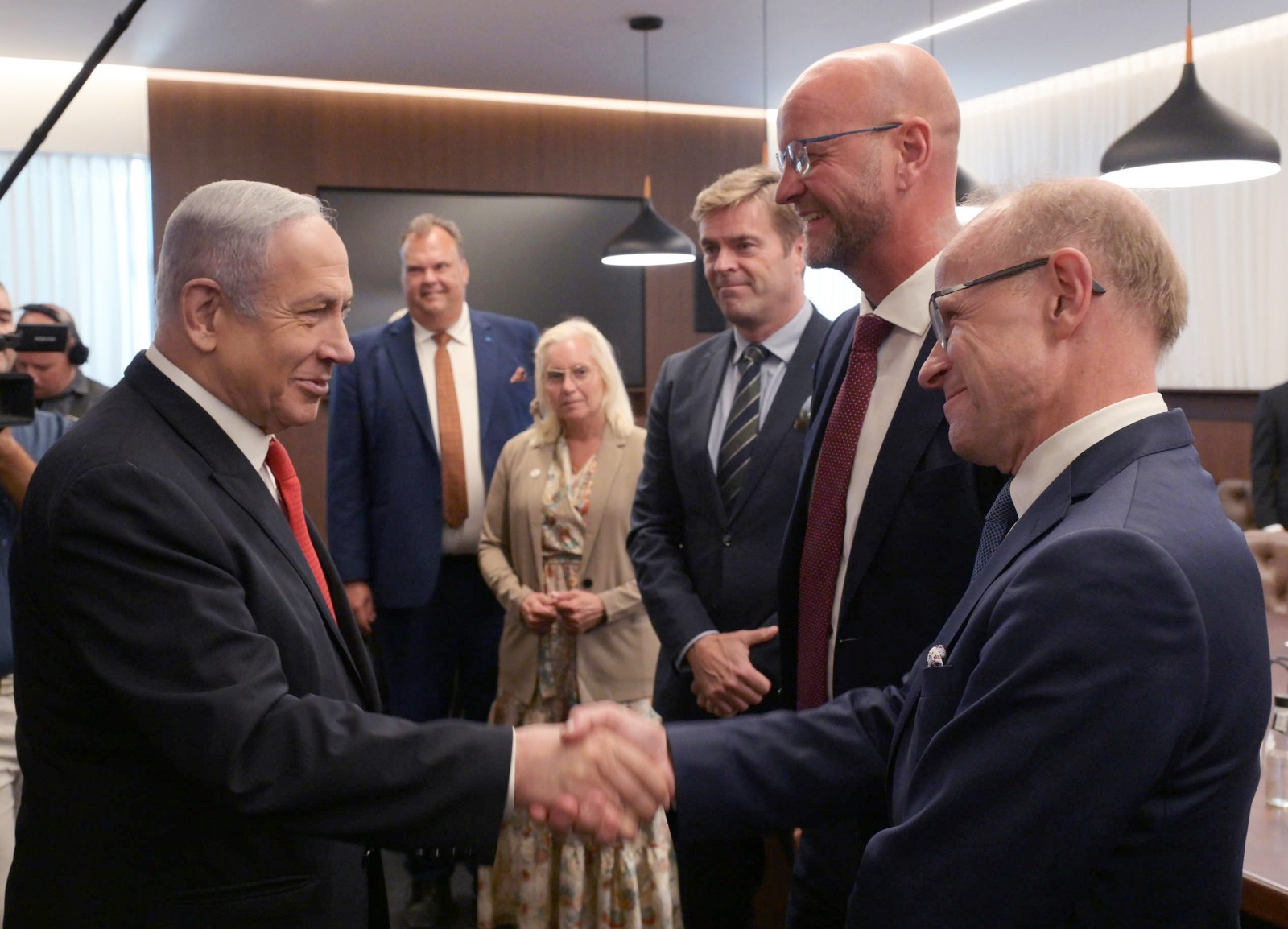Reversing the trend in Swedish-Israel policy
A delegation of ten MPs from Sweden made a week-long visit to Israel at the turn of August-September. More than half of the ruling party’s Christian Democratic 19 members of parliament met both Israel’s prime minister and foreign minister.

– I’m happy to see that there’s a change in Swedish policy, said Israeli PM Benjamin Netanyahu during the 40-minute meeting with 10 Swedish MPs. Photo: Government Press Office
On Monday, August 28, the Swedish parliamentarians were welcomed to Benjamin Netanyahu’s office and met the Israeli Prime Minister in a 40-minute long, historic meeting.
– I want to thank you for your great and consistent support for Israel. I’m happy to see that there’s a change in Swedish policy, Netanyahu said, stressing that it was about time.
– Not only for Israeli-Swedish relations but also for Sweden itself. I believe that our relations can yield great results in many areas. So I think this is an important beginning, he continued.
During the meeting, the Christian Democrats from Sweden promised to work toward Sweden moving its embassy in Israel to Jerusalem and for Swedish funding paid to the UN agency UNRWA (United Nations Relief and Work Agency for Palestine Refugees in the Near East) to end and that responsibility for Palestinian the refugees is transferred to UNHCR (United Nations High Commissioner for Refugees).
Another issue discussed was efforts to counter anti-Semitism.
– Sweden has just opened a Holocaust Museum, said Mikael Oscarsson and recalled Sweden’s work to curb anti-Semitism both in Sweden and internationally.
Full attention
Prime Minister Netanyahu responded by referring to the Swedish diplomat Raoul Wallenberg’s rescue operation of tens of thousands of Jews during the Second World War, an operation which he believes binds Sweden and Israel together.
The delegates’ week-long visit to Israel received a lot of attention in Israeli media, and Sweden’s former defense minister Peter Hultqvist from the Social Democrat party wrote in one of Sweden’s largest morning newspapers, Svenska Dagbladet, that the visit means a “new course on the Israel issue”.
Relations between Israel and Sweden deteriorated seriously when Sweden, as the only country in the EU – apart from Cyprus (1988) and a handful of communist dictatorships in Eastern Europe prior to the fall of the Soviet Empire in 1991 – recognized Palestine without making counterclaims in 2014. Relations deteriorated further when Foreign Minister Margot Wallström in 2016 criticized Israel for using “extrajudicial executions” in its fight against acts of terror. In the same year, Sweden and Iran signed a lucrative trade agreement just as a new report from Business Sweden predicted that Sweden’s exports to Iran could soon increase to between 15 and 20 billion kronor a year.
At the beginning of 2017, a number of female representatives of the Swedish government’s feminist foreign policy made a high-profile trip to Iran, where, wearing Muslim veils, they met Iran’s religious leadership.
Hezbollah threats
Iran supports a number of anti-Israel terror groups around Israel, including Hezbollah in Lebanon, which at the end of July threatened Sweden with attacks due to the Koran burnings carried out in Stockholm recently. In early August, an unsuccessful attack was made on the Swedish embassy in Beirut, which according to observers was carried out by Hezbollah.
Immediately after the Swedish delegates’ meeting with Netanyahu, the Christian Democrats also visited the Israeli Ministry of Foreign Affairs and Foreign Minister Eli Cohen, who began by thanking them for their friendship and support. He stated that the last two years have meant a very positive development of relations between the two countries.
– I was very happy to visit your country a few months ago to develop our relations, he said.
During the visit to Israel, the Christian Democratic parliamentary group also met the opposition politician and chairman of the Knesset’s Israel-Sweden friendship association, Naama Lazimi from Labor.



